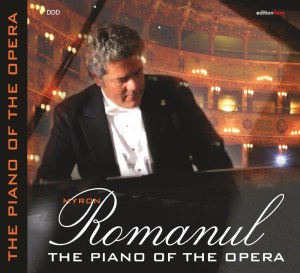Bevor
es die Möglichkeit gab, Musik auf Tonträger aufzunehmen, war
Musik nur live in Theatern, Konzertsälen oder privaten Salons zu hören.
Viele Komponisten, die auch Pianisten waren, traten in diesen Salons auf,
mit Improvisationen zu Opernthemen, so wie heute beispielsweise Jazz-Musiker
improvisieren über einen Song aus einem Musical. Später wurden
viele dieser Variationen niedergeschrieben und veröffentlicht, so
dass jeder sie spielen konnte. Für gewöhnlich beginnt ein Dirigent
oder eine Dirigentin an der Oper seine/ihre Laufbahn als Pianist/in, studiert
mit Sängern deren Partie ein und manchmal begleitet er diese auch
bei Liederabenden oder Konzerten. Nur sehr wenige dieser Dirigenten sind
jedoch in der Lage, ihre Qualität als Konzertpianisten zu erlangen
oder zu bewahren. Einer dieser Künstler ist Myron Romanul.
Myron Romanul zählt zu den faszinierendsten und bemerkenswertesten
Musikern von heute. Viele Jahre lang war er sowohl als Konzertpianist tätig
wie auch als Dirigent. Er ist zudem der Enkelsohn von Stella Roman, der
füh-renden dramatischen Sopranistin an der Scala und an der Metropolitan
Opera. Sie studierte und erlernte in Italien die Kunst und die Traditionen
der Oper. Sie hat außerdem mit vielen namhaften Künstlern zusammengearbeitet,
wie Tullio Serafin, Bruno Walter, Giovanni Martinelli, Leonard Warren &
Ezio Pinza, um nur einige zu nennen. Alle ihre Erfahrungen gab sie an ihren
Enkelsohn weiter, der ihre Tradition fortführte mit begeisternden
Auftritten in unzähligen Theatern, in denen er als Dirigent wirkte.
Romanul liebt die Musik-Performance in einer Vielzahl von Genres, ganz
gleich ob Oper, Operette, Ballett, Musical – oder gar Marionetten-Theater.
Bei seiner Arbeit mit Orchestern, Kammerensembles und Big Bands, vereint
er alle, die mit ihm arbeiten, in der Freude, Musik zu machen. Mit dem
vorliegenden Programm erweckt Romanul das Klavier zu neuem Leben als Orchester,
um so das Opernerlebnis im Theater wieder aufleben zu lassen.
Myron
Romanul homepage
|
Before
recordings on tape, CD, DVD and the vinyl records that precede them, music
was heard only in theaters, concert halls and in private salons. Many composers
who were also pianists would play in these salons improvising on a theme
from an opera, very much like jazz musicians today would improvise on a
song from a musical. Later, many of these variations would be written down
and published for all to play. Usually a conductor in an opera house begins
his or her career as a pianist, playing for stage rehearsals, coaching
singers and sometimes accompanying them for recitals and concerts. Very
few of these conductors, however, are able to obtain or retain their quality
as a concert pianist. One such artist is Myron Romanul.
Myron Romanul is among the most fascinating and exciting musicians of today.
He has been active as a concert pianist and a conductor for many years.
He is also the grandson of Stella Roman, former leading dramatic soprano
at La Scala and the Metropolitan Opera. She studied in Italy learning the
art and traditions of opera. She has also worked with many of the top artists
such as Tullio Serafin, Bruno Walter, Giovanni Martinelli, Leonard Warren
and Ezio Pinza to name a few. She handed down all her experiences to her
grandson who has continued to create exciting performances in countless
theaters at which he has conducted. Romanul enjoys performing music in
a variety of genres, whether it is opera, operetta, ballet, musical – even
marionette theater. In working with orchestras, chamber ensembles and big
bands, he brings everyone who works with him together to share the joy
of making music. With this program, Romanul brings the piano to life as
an orchestra to recreate the experience of opera in the theater.
Myron
Romanul homepage
|
Avec
l'évolution technique de l'enregistrement du son, la façon
d'écouter de la musique changea progressivement. Les compositeurs
du 18ème jusqu'au début du 20ème siècle jouèrent
au piano leurs compositions dans des théâtres et des salons
privés. L'improvisation y prenait une place importante. Ces improvisations
por-taient surtout sur des thèmes d'opéra. De nos jours,
on pourrait les comparer à celles des musiciens de jazz qui im-provisent
sur des thèmes de comédie musicale.
Le
piano remplaça alors les voix d'orchestre. De nos jours, un chef
d'orchestre d'opéra commence sa carrière en tant que pianiste
accom-pagnant les chanteurs et cantatrices pendant les répétitions
ou en jouant sur scène. Il n´y en a que peu parmi eux qui
gardent leurs qualités originaires de pianiste.
Myron Romanul en est un. Par là, il s´inscrit dans une lignée
familiale de musiciens aux talents multiples.
Ce
fut d'abord sa grand-mère Stella Roman qui quitta la Roumanie pour
étudier le chant. En Italie, elle devint une des grandes divas de
l'époque.
A
la Scala et la Metropolitan Opera, elle avait la chance de travailler avec
les plus grands artistes de l'époque tels que Bruno Walter, Giovanni
Martinelli, Tullio Serafin, Leonard Warren et Ezio Pinza. Stella Roman
gagna vite les faveurs d'un public enchanté par son charme et sa
grande maîtrise du chant. Plus tard, elle transmit le fruit de ses
expériences à son petit-fils en découvrant son talent
de musicien. D'abord, Romanul apprit plusieurs instruments. Plus tard,
il eût l'occasion d'affiner ses aptitudes en tant que chef d'orchestre
dans des théâtres à travers tous les Etats Unis. Aujourd'hui
encore il a gardé le goût d'aborder différents genres,
soit l'opéra, l'opérette, le ballet, le musical – et même
le théâtre de marionnettes et le big band. Faire de la musique
en travaillant avec des artistes de tout bord est, pour lui, une manière
de partager le bonheur. Pour rendre hom-mage à la tradition de l'improvisation
et à l'opéra, Myron Romanul fait revivre le caractère
polyphonique du piano sur ce CD.
Myron
Romanul homepage
|
Prima
dell'avvento delle registrazioni su dischi in vinile, su nastro, e i suoi
nuovi supporti CD, DVD, la musica si ascoltava solo nei teatri, nelle sale
da concerto, e nei saloni privati. Molti compositori, (che erano anche
pianisti), suonavano in questi luoghi improvvisando su molti temi
del repertorio dell'opera lirica, potremmo dire: proprio come i musicisti
di jazz fanno oggi. Nel tempo molte di questi variazioni sarebbero state
scritte e pubblicate per poter essere suonate da tutti. Generalmente un
direttore d'orchestra comincia la sua carriera in un teatro lirico come
pianista, suonando durante le prove, facendo da insegnante, per i cantanti
accompagnando quest‘ultimi nei concerti. Pochissimi di questi direttori
d'orchestra comunque sono capaci di ottenere e conservare la loro qualità
di pianista concertista. Myron Romanul è uno di questi.
Myron Romanul è uno dei piú coinvolgenti musicisti di oggi.
Da molti anni attivo come concertista e direttore d'orchestra. Esso è
inoltre nipote di Stella Roman, che fu' primo soprano drammatico alla Scala,
e al Metropolitan Opera. Quest'ultima ha inoltre studiato in Italia imparando
l'arte e la tradizione dell'opera lirica, lavorando con molti rinomati
artisti, tra questi: Tullio Serafin, Bruno Walter, Giovanni Martinelli,
Leonard Warren e Ezio Pinza, solo per citarne alcuni. Stella Roman ha nel
tempo tramandato tutte queste innumerevoli esperienze al nipote, accrescendone
la capacita' di emozionare pubblico e critica durante le sue tante rappresentazioni
e in tutti i teatri dove è stato direttore. Romanul è un
musicista eclettico, capace di spaziare tra diverse generi, tra questi:
l'opera lirical'operetta, il balletto, il musical – e persino il teatro
di marionette, capace di coinvolgere con entusiasmo gli orchestrali e gli
ensamble sotto la sua guida. Con questo programma Romanul porta a rivivere
il pianoforte e l'orchestra, a ricreare in teatro l'esperienza e l'incanto
dell'opera lirica.
Myron
Romanul homepage |

